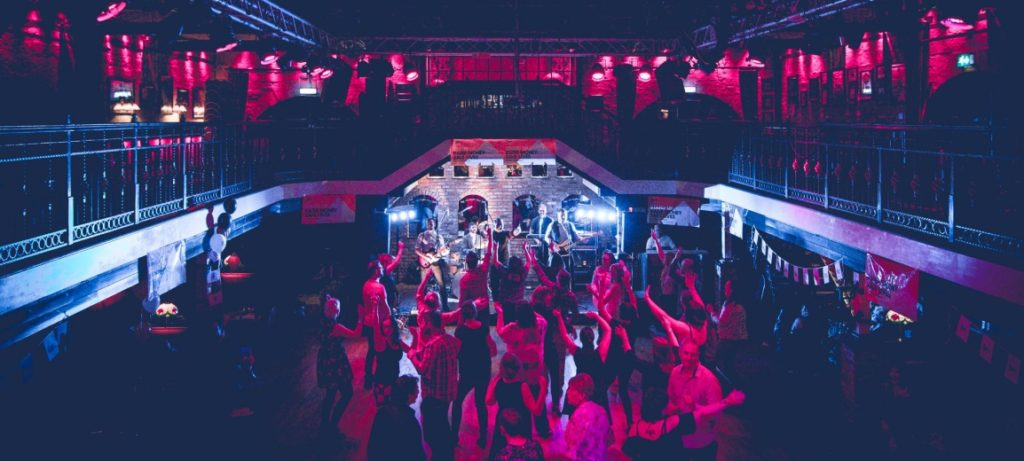‘Covers’ is a dirty word, it would be fair to say.
Covers bands don’t sell-out Wembley.
Covers bands are poor imitations of the original artists.
Covers bands are not what musicians want to be in.
Wrong, wrong, wrong.
I could pick so many examples to counter the first statement, but my mind drifts to an episode I heard recently by Slate’s Chris Molanphy on his podcast ‘Hit Parade’, concerning the origins of Britain’s perhaps-best-known reggae act, UB40 – (https://www.slate.com/articles/podcasts/culturegabfest/2017/04/how_red_red_wine_by_ub40_became_an_unlikely_hit.html) – which I thoroughly recommend, incidentally. He tells it much better, but in summary, many of the songs people might know and love and consider to be their songs are nothing more than covers: ‘Red Red Wine’, ‘I Shot the Sheriff’ and ‘(I Can’t Help) Falling in Love with You’ were all versions of tunes recorded previously by other artists. Do we judge them for that?
Your personal opinions on UB40 notwithstanding, my point is that any act who chooses to take a song, whether obscure or already popular, and honour/revive it with a reworking in a new style, certainly deserves to play sell-out shows no less than an act that classes themselves as ‘original’, so I would say, certainly not.
Secondly, imitation is the sincerest form of flattery. I am a long-standing fan of the yacht rock pioneers Steely Dan (gosh really showing my age/tastes in this blog, I apologise). Fans, or actually probably also foes, of the band, are aware of their meticulous studio attitude, hordes of guest session musicians on every track, and arrangements fine-tuned to within an inch of retaining any organic musicality…and whether they like or loathe these traits is up to the individual. What we all can agree on, though, is that this attitude makes for a shocking live performance, and having been to see them tour, I can attest to both the navel-gazing and general dismissive attitude towards the audience. When I went to see ‘Nearly Dan’, perhaps their best-known covers band, however, the show was electric. These people loved these songs so much and gave far more of a hoot about them than the original act did, and that energy was infectious. The notes they played were identical, but the experience as a member of the crowd was immensely superior, and whilst I will still listen to the originals at home, I would sooner run to see the cover band in a heartbeat.
Thirdly, with the proliferation of the internet, easy recourse to home recording, and a market swamped by supply, it is easy to take a view of the music industry as one in which every performing member is a starving intellectual poet of sorts, and has some message they feel soul-driven to impart to the world. And it is therefore easy to assume that any member of the industry not doing so is in some way under-selling themselves, or having a bad time of it. Historically, this has in the vast majority of cases, not been the case. Hark back only a few hundred years to when popular music was orchestras, or even more recently, big bands, and you have situations where one person was the composer of the music, and everyone else in the ensemble just played someone else’s songs. They were still virtuosos, they were still hugely respected creatives, but they were certainly doing their best job to play the other guy’s music almost one hundred percent of the time. And, truthfully, these days, life isn’t much different. Granted, when you go to see your favourite top 40 performer sell out a show, it’s their name on the playbill. But everyone else on stage is a musician playing someone else’s tunes and having a ball. And, more often than not, that solo performer might themselves not have any writing credit on their tunes whatsoever, so they’re performing someone else’s tune too!
So hopefully we can dispense with ‘covers’ as a dirty word.
Now let’s explore what good can be done with it.
Ok, final bit of insight into my life; I run a pub quiz every week, for my sins, and the final question of the music round is always an obscure cover I’ve found of a well-known song. And, without a doubt, watching all the regulars cocking their heads to one side until they can figure out what it is, and, better yet, seeing the smile cross their faces once they get it, is a source of as much joy to me as it seems to be to them. That ‘can you tell what it is yet?’ power of the cover occurs nowhere else, and provides musical interest like nothing else. Equally, on the subject of musical interest like nothing else, when an artist covers a song, especially if it is a totally different instrumental lineup to the original, they can find new textural ways to orchestrate the music, or even bring what were originally throwaway background lines to the fore, and reshape our understanding of the material totally. Finally, and whilst it seems crass to bring it up, it’s important: can you afford to book Ed Sheeran at your wedding? I suspect, if you’re on this website, perhaps not. Can you afford an artist who performs some of his tunes? Much more likely.
In short, a covers act provides unrivalled musical potential and joy.
Especially if it’s a completely different line-up to the original act.
Especially if they treat the songs you know in a novel way.
And especially if the act is small enough to provide great value.
